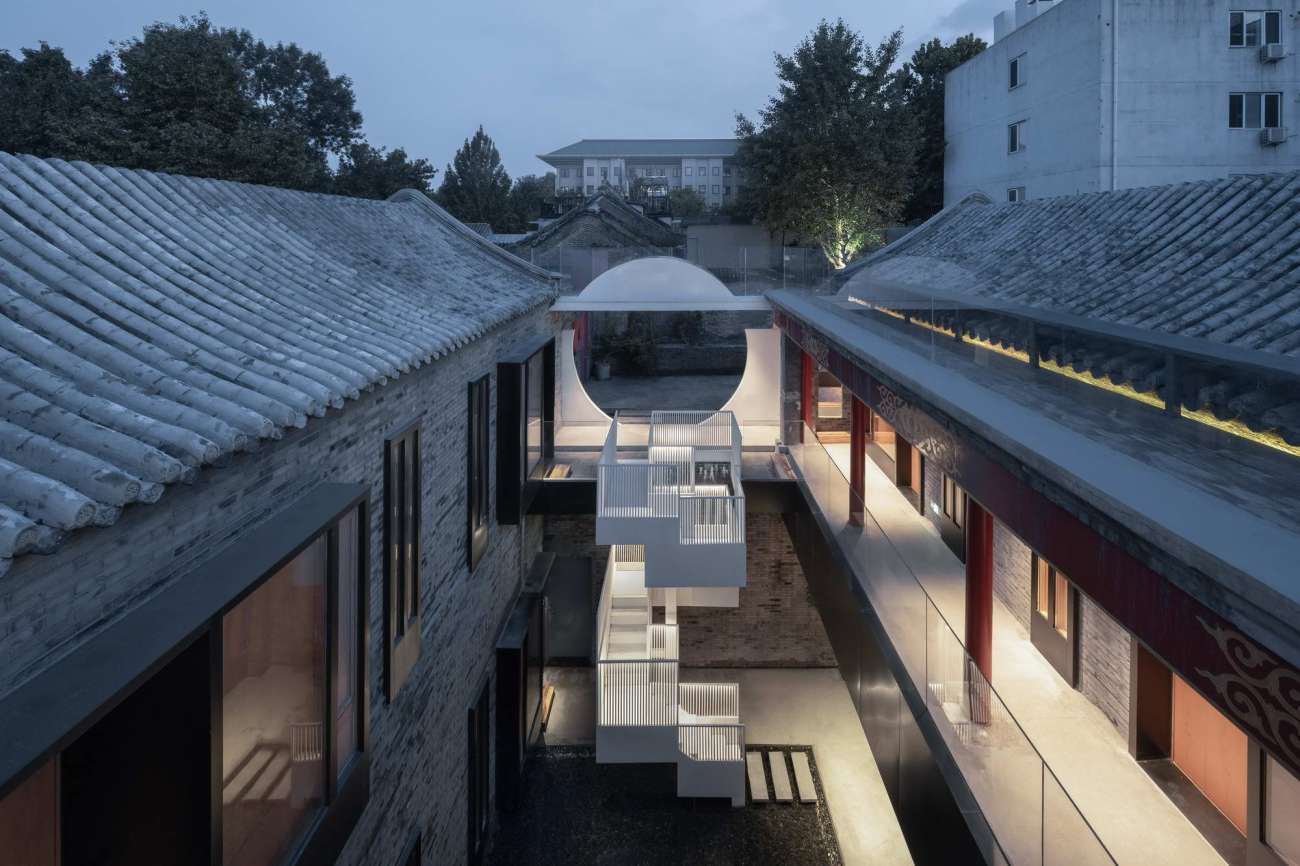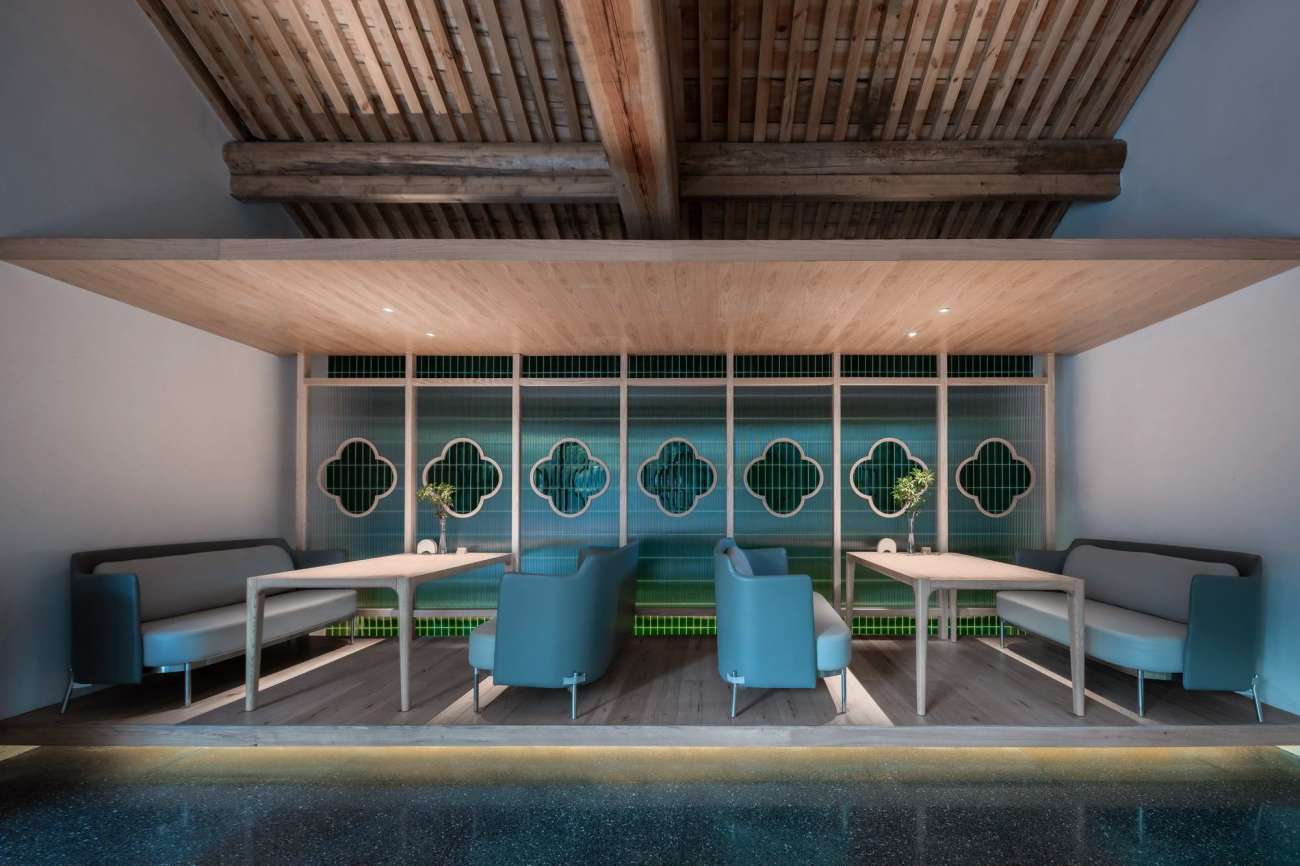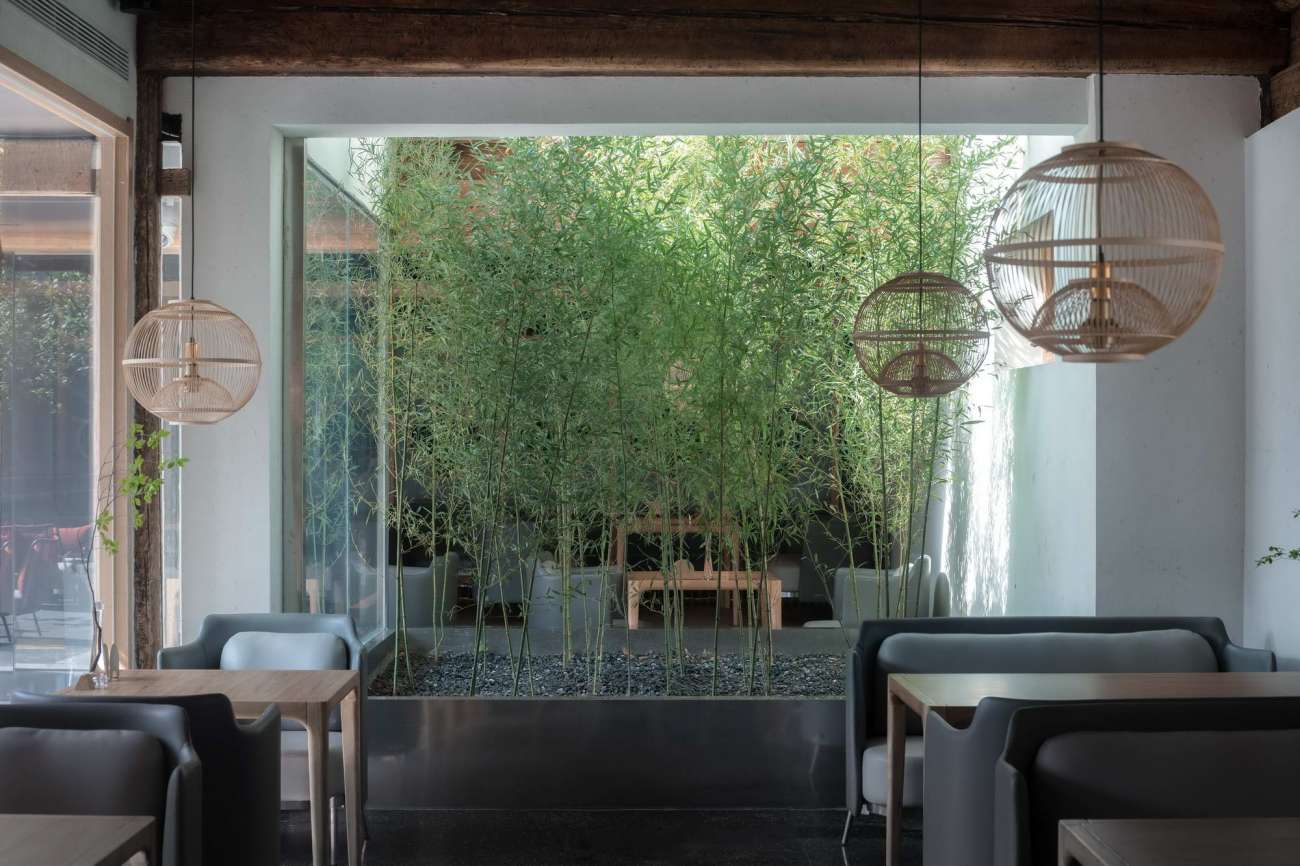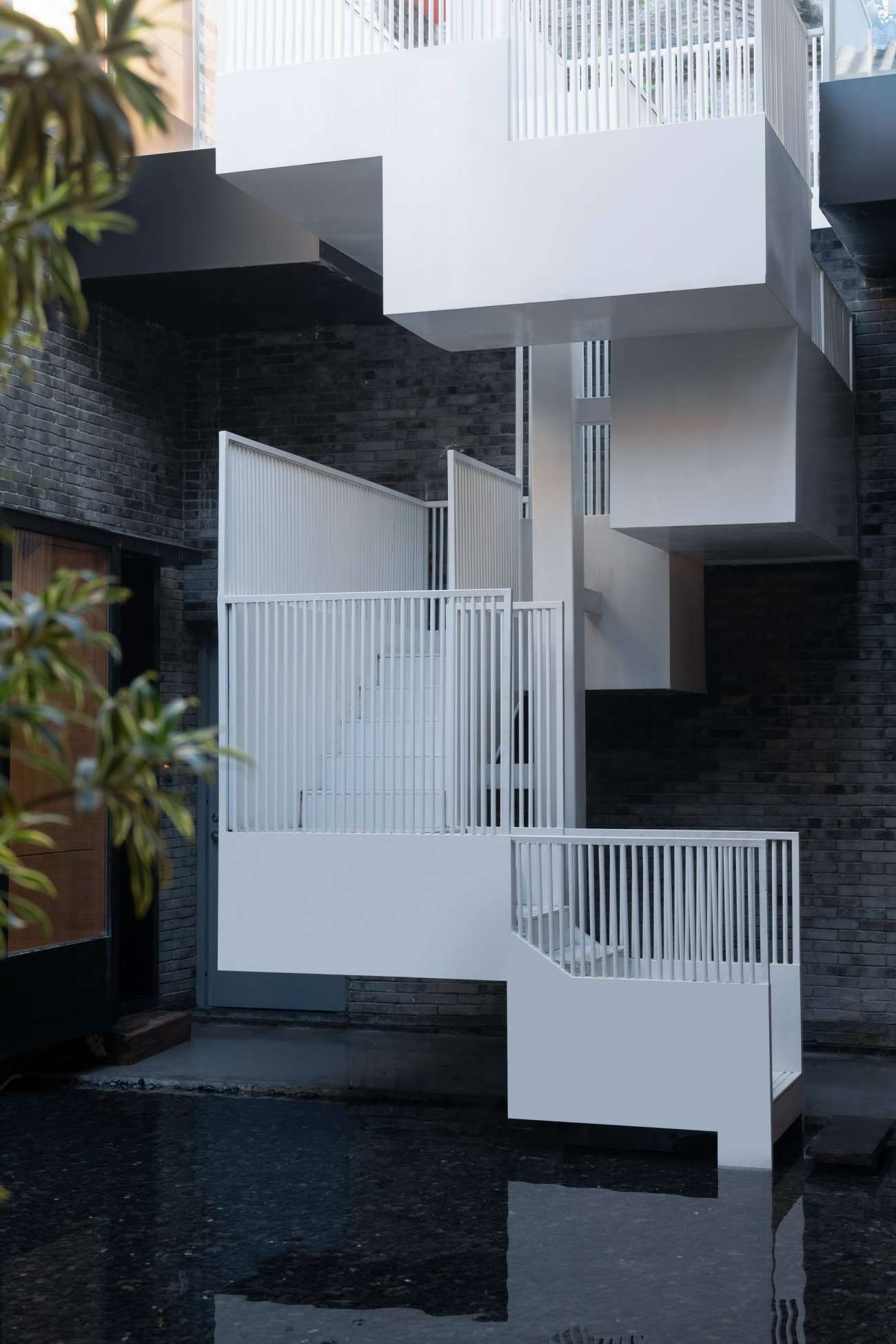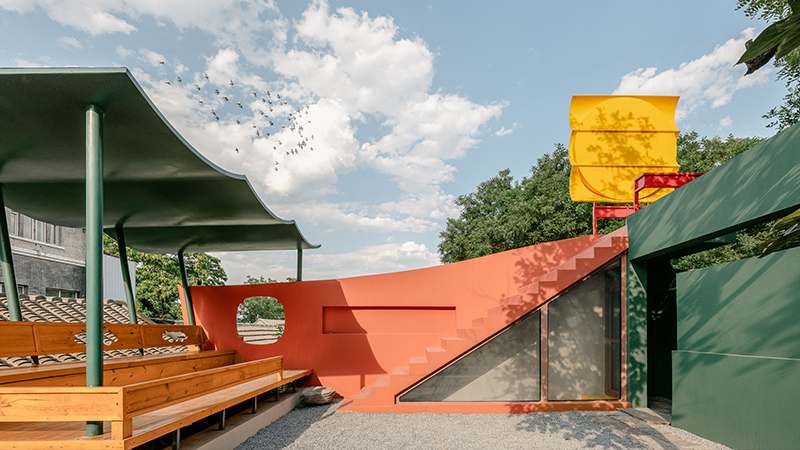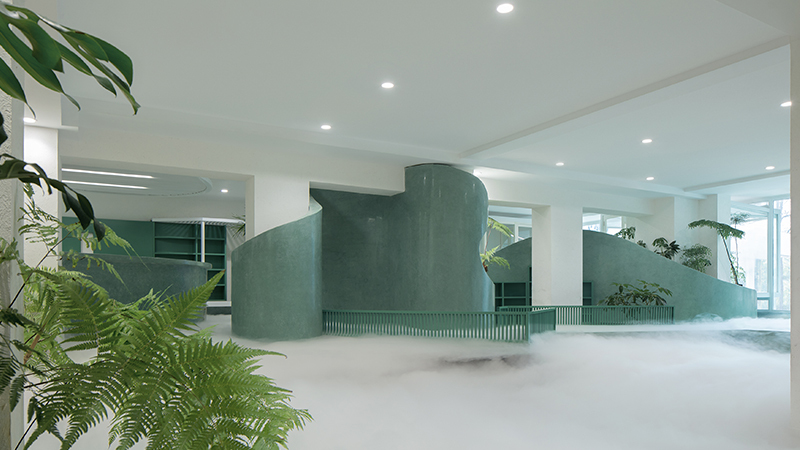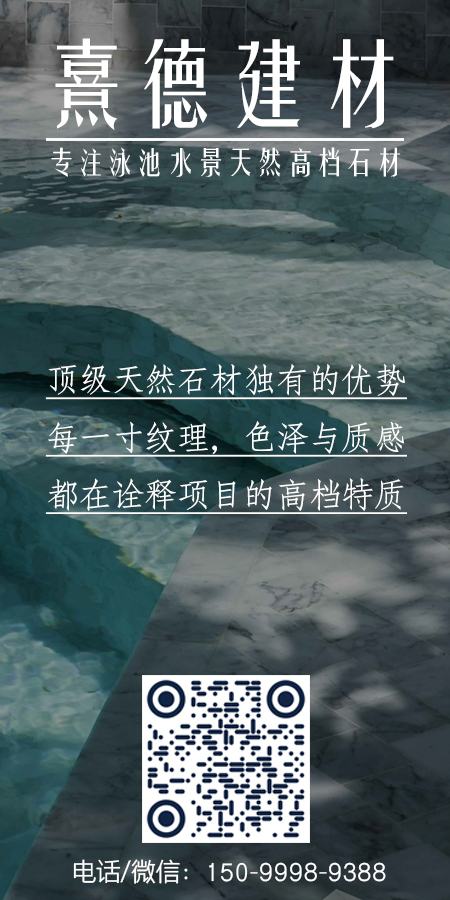|非典型四合院|Unconventional Siheyuan
项目位于北京市北锣鼓巷91号,面积约1400平,业主为北京彝席之地。场地是一个即传统又非传统的四合院。传统之处为北京城内核心区的两进四合院,四方规整,四周临近建筑也皆为四合院。非传统处为这个场地现状具备面积颇大的地下空间,且在二进院开出天井,形成了独特的双层合院的特殊空间。业主方期望将此改造成一个具备餐饮,下午茶以及民宿功能的空间。
The project is located at No. 91 Beiluoguxiang, Beijing, with an area of about 1,400 square meters. The client is BeijingYIxizhidi Hotel. The site is a traditional but unconventional courtyard house, Siheyuan. It is the traditional two tier courtyards in the central area of Beijing. The site is regular, and the surrounding buildings are also courtyard buildings. The unconventional part is that the site has a large underground space now, and a patio is lower level in the second courtyard, forming a special space with a unique double-height patio. The owner expects to transform this site into a space with restaurant, afternoon tea and homestay.
△ 一进院空间概览 First tier courtyard overview
|建筑与情境|Architecture and Scene
每个场地有着其特殊性,设计的意义在于根据其特殊性赋予新的可能性。所以在设计时考虑到业主品牌需求及场所现状,我们提出“新与旧的穿插对话”的设计概念。设计伊始以创造一个以北京老四合院传统空间和符合彼时当下的新空间相遇为母题的建筑体验空间为目的。为了达到这个目的,我们从“两院三径,三空间色”去控制整个场地。
Each site is unique, and the significance of the design is to give new possibilities according to its particularity. Therefore, considering the demands of the client’s brand and the current situation of the site, we propose the design concept of "the dialogue of interlocking new and old". To begin the design, the intention is to create an architectural experience space with the encounter between the traditional space of Beijing's old courtyards and contemporary space that conforms to the time and the present. In order to achieve this goal, we defined the entire site into "two courtyards, three paths, and three space colors".
-“两个院子”:场地现状 “Two courtyards”: Site Conditions
现状为两进院的四合院,一进院为餐厅,下午茶空间,二进院为民宿空间规划。
The existing site is two tier courtyard buildings, the first tier is a café with afternoon tea space, and the second courtyard is planned to be a homestay space.
△ 二进院空间概览 Second tier courtyard overview
-“三条路径”:建筑布局 “Three paths”: Plan Layout
置入一套屋顶连廊系统统一前后两个院落空间,形成天上,地上,地下三个层级路径串联的空间次序。连廊系统也提供了更多的消费场所。整体空间体验上就形成了登高望远,合院穿梭,地下探幽的三个层级,增加了空间体验的丰富性。
A set of roof corridor system is inserted to unify the front and rear courtyard spaces, forming a spatial sequence of three-level paths in the sky, ground and underground. The corridor system also provides more places for consumption. It generated three levels of overall space experience, one is climbing and looking into the distance on the roof, walking through the courtyards on the grounds, and explore in the underground, which increases the variety of the experience.
△ 屋顶连廊系统 roof corridor system
-“三空间色”:场所体验 “Three space colors”: Spatial Atmosphere
红与绿是传统四合院的经典用色之一,一进便以此二色为主,庭院为传统红色空间,室内餐厅则以绿色为主。同时将白色置入到二进院的非典型四合院空间,而形成新的民宿空间体验。
Red and green are the classic colors used in traditional Siheyuan. Once you enter, red and green are the main colors. The outdoor courtyard is a traditional red space, and the indoor restaurant is mainly in green. At the same time, white is placed in the unconventional courtyard space in the second courtyard to form a contemporary homestay space experience.
|红|RED
一进院是一个北京传统的老四合院,形制规整,保留着原有的照壁,抄手游廊,门窗等。对此我们对庭院围合空间进行修旧如旧的修缮策略,同时穿插进行了一些新的节点空间设计。
The first tier courtyard, it is a traditional old Siheyuan in Beijing. It has a regular shape and retains the original screen wall, veranda, doors and windows, etc. We remained those original elements and repaired and restored the enclosed space of the courtyard, at the same time, we inserts some new element designs.
△ 古建修缮中”一麻五灰”的施工工序 “One hemp five dust”technic in ancient building restoration
△ 修缮后的彩绘与门扇 Painting and door leaves after restored
在原有传统门扇的形制基础上进行了创新设计,将整体门扇分为可活动的上下两个部分,分可为窗,合可为门。
Based on the shape of the original traditional door leaf, an innovative design is carried out. The whole door leaf is divided into two movable parts, upper and lower, which can be divided into windows and combined into doors.
△ 打开上半部分门扇之后,形成独特的游廊景观 A unique veranda corridor is generated when the upper parts are open.
△ 门扇形成的框景 The framed view by upper door leaves
△ 游廊内部空间 Inside veranda
一进院的南边廊道处设置了一处月门,是联系一进院跟二进院的主要交通节点,同时这个月门也是链接地面交通跟屋顶交通的核心要道。
A moon gate is placed at the south corridor of the first courtyard, which is the main traffic node connecting the first courtyard and the second courtyard. At the same time, this moon gate is also the core connecting the circulation of ground and roof level.
△ 位于两进院之间的月门 The moon gate between the two courtyards
△ 月门西侧局部 the west side of the moon gate
|绿|GREEN
一进院的主房为用餐空间,以“绿”为场景主色。将原有古建房顶进行翻新处理,同时将四合院的亭廊,花窗等空间元素置入空间中,结合新材料,形成新的空间体验。
The main room of the first tier is the dining space, with "green" as the main color. The original roof was renovated, and the pavilions, corridors, lattice windows and other spatial elements of the courtyard were placed in the interior, and new materials were combined to form a new spatial experience.
△ 正北房用餐空间 The dinning space in the main room
△ 东耳房用餐空间 Dining space in east side room
△ 东厢房用餐空间 Dining space in east wing room
△ 东厢房吧台 Bar counter in east wing room
△ 东厢房小竹林 Bamboo landscape in east wing room
|白|White
二进院是相对私密的客房区。整个空间是一个环绕中间下沉庭院的特殊四合院空间。两层合院布置有12间客房。每间客房都对着天井采光。我们在天井内造了一个白色的揽月台,以登台揽月为视觉主景成为每个客房都能看到的特色景观。
The second tier is a relatively private guest room area. The whole area is a special courtyard space surrounding the sunken patio in the middle. There are 12 guest rooms around the double height courtyard. Each room is facing to the patio for natural light. We built a white moon-viewing platform in the patio, and the main visual scene is the moon-viewing platform, which has become a characteristic landscape that every guest room can see.
△ 揽月台入口 The entry of the moon-viewing platform
△ 二进院入口 The entry of the second tier courtyard
△ 白色揽月台与红色月门 The white moon-viewing platform and red moon gate
二进院原有的下沉庭院设置了一方静水池面,可倒影揽月台。风吹过时,波光粼粼,如同月亮亦会拾阶而上,从海面升起。
A still pool surface is places in the sunken patio, which can reflect the view. When the wind blows, the waves are sparkling, like the moon rising up from the sea.
△ 二进院下沉庭院内景 the inside view of the sunken patio in the second tier
△ 楼梯局部 detail of platform stairs
△ 下沉庭院内景 the inside view of the sunken patio
△ 下沉庭院内景 the inside view of the sunken patio
△ 客房室内空间 Interior of guest room
△ 客房室内空间 Interior of guest room
△ 客房室内空间 Interior of guest room
△ 带阁楼客房室内空间 Interior of guest room with loft
△ 将植物引入客房室内 Bring the view of the plants into the guest room
|结语|Epilogue
本次项目以新与旧的对话为出发点,在面对项目场地现状时对如旧修缮和为新改造的平衡中,以达到虽然终古常见,而光景常新的场所体验目的。
This project takes the dialogue between the old and the new as the starting point. In the face of the existing conditions of the project site, it balances the old repair and the new renovation, so as to achieve the intention of the place that is full of new and unexpecting experience, although it is common in the past.
△ 一层平面图 First Floor Plan
△ 剖面图 Section
项目名称:北锣鼓巷91号四合院建筑与室内改造设计
业主方:北京彝席之地[餐饮、民宿、下午茶]
项目地址:北京市东城区北锣鼓巷91号
项目类型:餐厅,民宿,茶室
设计方:介介工作室
主创设计师:明冠宇
项目负责人:亓明
项目成员:曹锦灿,王一帆,悦洁,张璇,刘文睿
照明设计:北京远瞻照明设计有限公司
施工图设计:北京卜建海施工图团队
摄影师:Chill Shine丘文三映
建筑面积:1400平方米
竣工时间:2022年2月
Project Name: No. 91 Beiluoguxiang Siheyuan renovation
Client: Beijing Yixizhidi (Restaurant, homestay, afternoon tea)
Adress: No. 91 Beiluoguxiang, Dongcheng District, Beijing
Program: Restaurant, homestay, tea house
Design Firm:Jiejie Studio
Architect:Ming Guanyu
Project Manager:Qi Ming
Design Team:Cao Jincan,Wang Yifan , Yue Jie, Zhang Xuan, Liu Wenrui
Lighting Design:z design & planning
Construction Drawing:Beijing BoJianhai Team
Photography:Chill Shine
Area: 1400 square meter
Completion:February 2022
更新日期:2022-03-23 14:47:27
非常感谢 介介工作室 带来的精彩项目, 查阅更多Appreciations towards Jiejie Studio for sharing wonderful work on hhlloo. Click to see more works!

